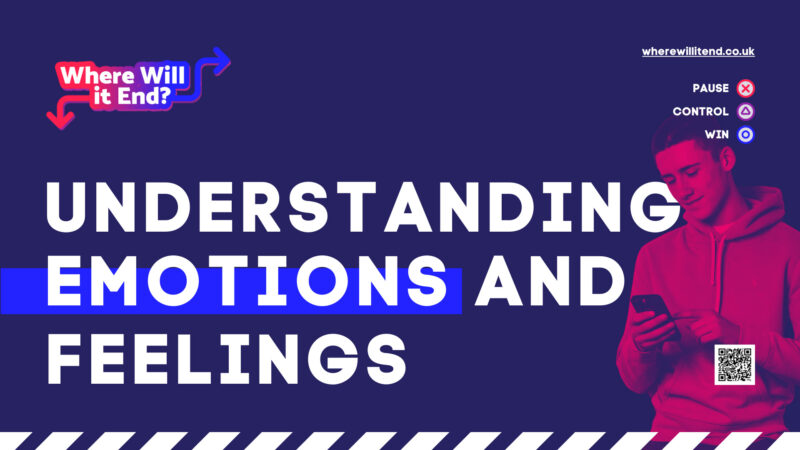Where will it end?
Pause. Control. Win.
Where will it end?
Life can be difficult, especially when growing up.
Every day we experience emotions and feelings that affect our behaviour choices. But they don’t have to.
Learn to PAUSE, CONTROL, WIN.
You can be the controller of your story and decide where it will end.
Find resources below to help you understand what emotions and feelings are, how they can affect your behaviour and how you can take control.

Have your emotions ever taken over?

When we feel emotions such as anger, sadness, fear and frustration, they can affect the decisions we make and our behaviour even before we realise we have them.
This can often be unhelpful and make us feel worse. But where will it end?
Watch this short video to see how emotions can influence our behaviour and where this can end.
If you struggle to understand and manage your emotions, download the Where Will It End guide for support.

What are emotions & feelings?

The terms emotions and feelings are often used together. However, understanding the difference between them is important as they connect to our everyday experiences and play an important role in how we see and interact with the world.
'Emotions'
Emotions usually involve three parts:
- A subjective experience – this means we all experience emotions.
- A physiological response – this is how our body reacts to our emotions. When we feel certain emotions, our bodies can physically react. For example, when we feel nervous we may feel sweaty.
- A behavioural or expressive response – this response is the way we behave or change our body language based on our emotions. For example, if we feel threatened we may tense our fists ready to protect ourselves.
'Feelings'
We all experience feelings differently. Unlike emotions, feelings are shaped by personal experiences, beliefs, and memories. Feelings are personal reactions of our emotions which can be different depending on our individual experiences and perspectives. For example, what might slightly annoy one person, might make another person really angry or upset if they have been affected by this previously. Feelings can persist over longer periods, affecting our mood and behaviour.

How can emotions and feelings affect us?

When we feel angry, it is often triggered by an external factor such as an argument. Once the trigger has happened, we then have internal thoughts that assess what has happened.
These thoughts can escalate our emotions and increase our feelings, resulting in anger or rage. When we have these feelings, we may then display negative behaviours and behave in an aggressive or violent way.
It’s important to remember that everyone feels emotions in their own way.
We have developed a guide to help you understand and manage your emotions and feelings.


Animation for children aged 5-10 years old

Emotions and feelings can affect our lives in lots of ways.
Jess, Sophie and Harry have been best friends since nursery, but recently Sophie has had a lot going on so she hasn’t been getting along with Jess and Harry.
Watch the animation to see how Sophie’s emotions have been affecting her behaviour and how Jess controls her own feelings and asks for help.

Are you struggling with your emotions and feelings?
Where can I ask for help?
If you’re struggling to control your emotions and the way you are behaving, try talking to a friend, teacher, brother or sister, parent or carer, or another family member you trust.
Local support
If you would like professional support, you can refer yourself, or your child, through the Single Points of Access below. Please contact the area that best describes where you live.
- If you live in Newcastle-under-Lyme, Staffordshire Moorlands or Stoke-on-Trent call: 0800 0 328 729
- If you live in East Staffordshire, Tamworth, Lichfield, Cannock, South Staffordshire or Stafford call: 0808 178 0611 or email: CaFSPA@mpft.nhs.uk
Other local resources
- Staffordshire Connects has lots of information about mental health and general well-being, including support services you can contact.
- Stoke-on-Trent 0-19 Hub covers all localities in Stoke-on-Trent. You can speak to your School Nursing team during school term or you can call the Hub on 0808 178 3374 or message them through their ChatHealth text messaging service on 07520 615723
- Sandbox has lots of resources, such as a mood tracker, to help you recognise your emotions and feelings and what happened to cause these.
Advice for parents and carers
The guide on understanding emotions and feelings has been designed to also support parents and carers when talking to your children about their emotions. Included within the guide are resources to help guide conversations and alternative ways for your child to communicate how they are feeling.
Additionally, the animation above has been developed to demonstrate how emotions and feelings can affect different aspects of a child’s life and why they should seek help if they are, or a friend, are struggling to understand and manage their emotions.

Partners
The Where Will It End campaign has been developed by the Staffordshire and Stoke-on-Trent Violence Reduction (VRA) and young people living in Staffordshire and Stoke-on-Trent.
The VRA worked with Dizzy Heights, a local youth group, to engage with young people who have been involved in violence to better understand their views on what the campaign should aim to achieve.
To find out more about the background of the campaign and to download the campaign assets, visit the campaign’s partner page.

